SUGGESTED ANSWERS FOR LITERATURE
PART I: Reading comprehension (4 points).
Question 1. Identify the narrative voice used in the text.
The text uses third person narrative.
Question 2. In the text, Le's hometown and Son's hometown are associated with which two rivers?
-Le's hometown is associated with Lam River (mentioned through the detail "the artillery emplacements there are built with the alluvial soil of Lam River, bright yellow as turmeric").
-Son's hometown is associated with the Red River (mentioned through the detail "The alluvial soil of the Red River gives Le people a cool feeling" when Le is in Hanoi ).
Sentence 3. Analyze the effect of the rhetorical device of comparison in the following sentence: Their artillery company was like a large tree, its sap full and spreading into two branches.
The rhetorical device of comparison "Their artillery company was like a large tree, its sap filled with sap spreading out into two branches" has the effect of:
- Emphasizes solidarity and unity: The large tree roots and full sap symbolize the maturity, solidity and strong vitality of the artillery company.
- Showing the inevitable separation but still connected with the same mission of fighting for national independence and freedom, they still carry within them the spirit, strength and connection that was formed in the soldiers' footsteps.
- Evoking specific, vivid images, increasing the evocative power for readers to easily visualize the development and then the separation of the company, creating a deeper impression of comradeship and teamwork.
Question 4. State the role of the detail "They shared a sleeping mat, a few shirts that smelled of gunpowder, and shared the sky of the Fatherland above their heads" in expressing the content of the text.
- Affirming deep comradeship and camaraderie: "Sharing a sleeping mat and a few shirts reeking of gunpowder" shows the solidarity and sharing of all the hardships and difficulties in the soldiers' lives and battles. These are familiar items, closely associated with military life, sharing them shows closeness and considering each other as blood relatives. "Sharing the sky of the Fatherland above" has a profound symbolic meaning. Not only sharing material things, but they also share the responsibility and duty of protecting the Fatherland on different battlefields. This emphasizes that even though each person is in a different place, they still share the same noble goal, shouldering the mission of protecting the country.
- Evokes emotions of silent sacrifice: Sharing war-related items and sharing the "sky of the Fatherland" evokes the image of soldiers willing to sacrifice part of their body, part of their life to protect the country, creating emotion for the reader.
Sentence 5. The two texts have similarities in meaning in that they both describe the deep, sacred attachment between people and the land where they lived, fought, and experienced. Those physical spaces are not just inanimate places but have "become souls", "left half of the soul", and become an inseparable part of people's consciousness. This shows a deep love for the homeland and the respect for the memories and life marks that are associated with that place.
PART II: Writing (6 points = 2 points + 4 points).
Sentence 1. This is a paragraph where students can choose to express themselves using methods such as: inductive deduction, parallelism, chaining, etc.
The comradely love "from far away" (Chinh Huu), in the arduous battle, the soldiers connected with each other into a strong bond, with many dear memories. In the excerpt Different skies by Nguyen Minh Chau, Le had a sincere, deep, and special affection for Son, especially understanding and trust. Even though before that, Le did not have much sympathy for Son - the young master of Hanoi. Le's feelings for Son were the feelings of a person in arduous battle, closely connected by blood and flesh (that is the bed, the shirt, the sky of the Fatherland above the head, ...). They parted ways, this is also the normal course of war, simply "I really believe... I really believe in you", "Let's go". That shows the absolute trust of the "comrades". Le returned to Hanoi, Son stayed in Nghe An . Le always remembered Son even in his dreams. It was the alluvial lands of Hanoi that gave Le the feeling of meeting Son again here, the capital that Son once loved "every tree, every street corner" that suddenly reminded us of Che Lan Vien in The Song of the Ship "When we are here, it is just a place to live, when we leave, the land has become the soul". The love of comrades and comrades is eternally attached in the hearts of soldiers. The separation and reunion in the life of a soldier is an inevitable law of war, it is also a contrasting situation where one person has to fight to protect the homeland of the other, the psychological development from strangers to acquaintances. Le himself is fighting to protect the sky of Hanoi, also protecting Son's love for his homeland. The author skillfully builds a contrasting situation where two soldiers fight to protect each other's homeland, that is, the love of comrades closely intertwined with love for the country. The psychological development is suitable from strangers to acquaintances; from not loving the regional culture to loving the sky of the Fatherland. The success of building the psychology and feelings of the characters contributes to deeply expressing the theme of the work. Le's feelings for Son are also typical of the love for the homeland among the young generation during the anti-American war. "Love the people, love the country, want to stretch out to shoulder all the hardships" - (Tran Long An)
Sentence 2.
"The sky of any homeland is the sky of the Fatherland" - a seemingly simple saying but contains the depth of patriotism, of understanding and appreciation of diverse values across the S-shaped strip of land. In the context of the country's growing development and integration, clearly realizing this not only helps the young generation correctly identify their own role, but also fosters a deep love for their homeland.
First of all, each countryside, whether lowland or highland, urban or rural, has its own unique characteristics, contributing to the overall picture of the Fatherland. From the brilliant yellow of the rice fields in the Southwest to the immense green of the Northwest mountains and forests, from the dynamism of Ho Chi Minh City to the cultural depth of the ancient capital of Hue - all are irreplaceable "sky". Each place carries a different language, culture, and customs, but all blend into the Vietnamese identity.
Vietnamese youth is a precious source of vitality for the Fatherland, playing a key role in preserving national identity, protecting the country's peace and independence, and creating the future, taking the country far. Determining the "Fatherland's sky" correctly and sufficiently has important and practical significance, especially when our youth are facing a new era with many opportunities and challenges such as international integration, digital transformation, multi-faceted and multi-dimensional cultural waves...
Second, in any homeland, Vietnamese people always carry within them patriotism and a sense of responsibility towards the Fatherland. History has proven that from the Northern national defense soldiers to the Southern children - all for a common Fatherland. Today, doctors from Hanoi can volunteer to go to the epidemic center in Can Tho, border guards from Truong Son to Truong Sa... No matter where they were born and raised, in their hearts there is always the sacred call of the country. That shows that the homeland is only the starting point, and the Fatherland is the destination of every Vietnamese person.
Finally, the solidarity and unity between regions are the factors that create the lasting strength and territorial integrity of the Fatherland. A country cannot be strong if its people do not understand and sympathize with each other. The spirit of "the whole leaf covers the torn leaf", "one horse in pain makes the whole stable give up grass" is an invisible thread connecting all regions. During the COVID-19 pandemic, when the South was short of food, "charity" convoys from the North to the Central region traveled thousands of kilometers to deliver supplies. When the Central region was flooded, tens of thousands of donated gifts poured in from everywhere. It was not only an act of support but also a wordless declaration that: "No matter what sky we are in, we still share the same sky - the sky of the Fatherland."
In fact, young Vietnamese people today have clearly demonstrated the spirit of "the whole people, the whole locality is the Fatherland". H'Hen Nie - an Ede girl from the Central Highlands reaching out to the world, is not only a beautiful beauty queen but also spreads the will to overcome fate. She always has love for her homeland, developing many community projects from the Cultural House, book library, forest planting... not only promoting the beauty of her homeland but also actively contributing to promoting development in all regions of the country. Den Vau - a rapper from the mining area, from a sanitation worker to an artist bringing simple but profound music to every province and city, especially with the projects "Cooking for you" and "Forest music" has conveyed a profound, strong message about compassion, nurturing knowledge and preserving green and culture for future generations. And there are thousands of young people who volunteered to go to Truong Sa to become island soldiers, engineers, doctors – "sky regions" far from the mainland but very close to the national ideal. These examples were not born in the same place, did not grow up in the same countryside, but shared the same heart – the heart of the Fatherland.
Besides, we also need to recognize that localism still exists somewhere – causing the connection to be broken. There are also areas that are forgotten in the common development. Therefore, patriotism today is not just an emotion, but must be an action to create fairness for all homelands. A strong country is a country where every region is understood, loved and invested in for proper development.
The biggest lesson for young people is: love the place where you were born, but do not limit that love within the narrow borders of "my hometown". Knowing how to open your heart to other lands - to understand, to sympathize and to develop together is a practical and mature way of loving the country. Learning about the rich culture of 54 ethnic groups; appreciating and loving the beautiful, rich and diverse natural landscapes throughout the country; attracting investment and exploiting the development potential of localities on the basis of respecting indigenous culture; connecting and comprehensively developing the territory of Vietnam, that is the mission of the times, the mission from the nation for young people.
Because, if the Fatherland is a vast sky, each homeland is a star. The saying "Every homeland's sky is the Fatherland's sky" is not only a reminder of patriotism but also a call to live with tolerance, responsibility and solidarity. When each person knows how to love their homeland, understand other people's homeland and know how to work towards the common good, then the country will truly be stable under a common sky - a sky of peace, development and pride.
Question 2 (for reference)
"When we live, it is just a place to live,
When we walk, the earth suddenly becomes our soul.
Love turns a strange land into a homeland"
Every sky in Vietnam is the sky of the Fatherland. Love for the Fatherland is a sacred feeling, an invisible thread connecting each person to the country. The sky of the homeland is attached to all of us since childhood. When leaving behind childhood memories, entering the war to protect the homeland, with close comrades, on the boundary between life and death, people will feel all the depth of the two words Fatherland.
We do not need to go to every corner of the country, but only need to be attached to a familiar and specific "homeland sky". The text "Different skies" by Nguyen Minh Chau has suggested a close connection between the affection for the specific homeland and the love for the vast Fatherland, affirming that: "Every homeland sky is the Fatherland sky".
Homeland, where we were born and grew up, is the origin of our love for the country. In the context of our country changing, Binh Dinh province became Gia Lai province, Ninh Thuan province became Khanh Hoa province, Long province became Tay Ninh province, Ben Tre province became Vinh Long province, but the souls of the children there, the names of villages and provincial capitals from childhood will never be forgotten. Moreover, any sky in Vietnam is the sky of the Fatherland, and more broadly, the sky of humanity.
The attachment of Le and Son to their homeland is a concrete proof. From the artillery soldiers fighting in the war against America, they have experienced many ups and downs, far from their birthplace, but their love for their homeland is always present. Le, although mobilized to Hanoi, still carries with him the nostalgia for the old land. Son, after fierce battles, still keeps in himself the belief that a homeland will be protected. Le's words to Son: "We will protect the dam and the sky of your homeland at all costs...". Actually, more precisely, it is ours, not just yours or mine. Every hill, every river, every street corner, every bamboo bank and rice roots are soaked with the sweat and blood of our ancestors. Love and gratitude for the previous generation are the bricks that build love for the Fatherland. It is the source of emotions, the material that nurtures patriotism, the motivation for each individual to be ready to contribute and sacrifice.
Pho Duc Phuong wrote: "Without a homeland, where can we go?". Family and Fatherland are the sacred sources for people to live, fight, sacrifice, be happy and feel that their existence is meaningful.
The concept of "homeland" has gradually expanded, becoming "Fatherland". Long marches, the journeys through Cau Bung, Cau Ho, Ham Rong, Nam Dinh, Phu Ly... have helped us realize that every place we set foot, whether strange or familiar, is a part of the country. "One hundred soldiers have one hundred different lives and homelands." - this saying not only shows the diversity of origins but also implies that each "homeland", no matter how different, shares the same "Fatherland sky". The homeland is no longer confined to a narrow geographical space but has been elevated to an inseparable part of the sacred Fatherland. It is the memories, the experiences, the sacrifices that have turned every inch of land into a part of the flesh and blood of the soul, of the Fatherland.
Even in peacetime, when the country is independent and developed, the "homeland sky" still plays an extremely important role in nurturing love for the Fatherland. There are Vietnamese people who do not live in Vietnam, but every time they return to their homeland, most of them cannot hold back their tears.
From the vivid and emotional writings of Nguyen Minh Chau, we can see that "the homeland sky" is the fulcrum, the origin and an indispensable part of "the Fatherland sky". Love for the Fatherland is nurtured from simple, sincere feelings towards comrades and specific lands, expanded and sublimated through experiences and dedication. "The Fatherland Sky" reminds us that the Fatherland has existed for thousands of years. Many generations have sacrificed, protected and built. Love for the Fatherland will forever be passionate in the blood of the Vietnamese people today and tomorrow.
LITERATURE EXAM QUESTIONS FOR HIGH SCHOOL GRADUATION EXAM 2025, as follows
READING COMPREHENSION (4.0 points)
Read the text:
DIFFERENT SKYSPACES
Summary of the scene: Le and Son were gunners during the anti-American resistance war. When they first met, Le did not have a good impression of Son - a white-skinned worker from Hanoi. After three years, his first impressions of Son changed. Le and Son became close friends. They also returned to Nghe An and were stationed near Le's village. During a battle, Son was seriously injured and had to go to the Military Hospital. When Son returned to his unit, he was assigned to continue staying in Nghe An, while Le was transferred to Hanoi. The following text tells the story of the two friends parting ways to fight in different regions.
One night, Le and Son stood together for a long time on a mound of earth surrounded by the sound of thunder and the sound of floodwaters. In front of the two commanders, the gunners of the old artillery company met in the western land of Quang Binh and said goodbye to each other. Their artillery company was like a large tree trunk, the branches spreading out into two branches. Le's company had arranged the artillery vehicles ready on the dike in a marching formation. Le stopped to look one last time at the sky of his homeland and said to Son:
- They have been sending reconnaissance planes every day these past few days...
- Don't worry. We will protect the dam and your homeland's airspace at all costs...
- I really believe... I really believe you!
After three years of living together since the two of them sat on two iron chairs of an old 37, this time Le and Son each received a mission. They shared a sleeping mat, a few shirts smelling of gunpowder and shared the sky of the Fatherland above their heads. In his deepest thoughts, he considered Son as the most intimate comrade in his soldier's life, "Go home!". They shook hands and said goodbye with only those two words.
Le began a long march. The trucks were loaded with equipment. Next to the cannons tilted to the sky, the ordinary lives of soldiers' children were displayed before the eyes of the world. Look at the anti-aircraft soldiers sitting proudly on both sides of the trucks; there were a hundred soldiers, a hundred different lives and different hometowns. They passed through Bung Bridge, Ho Bridge, Ham Rong and Nam Dinh, Phu Ly, leaving far behind Ngang Pass, Quan Hau, Bai Ha... The lands where they left half of their souls.
[...] So today Le stood under the Hanoi sky, next to his new and old comrades. It was almost dawn. Behind Le, the capital was filled with noise like a beehive just waking up. Le leaned against the wall of the artillery emplacement and remembered the dream he had just had: That's right, Son wasn't out here, Son was fighting in Le's homeland. The day the two of them said goodbye to each other on the battlefield of Son's company, the artillery emplacements there were made of the Lam River's alluvium, bright yellow as turmeric, in the middle of a riverbank planted with peanuts.
The Red River alluvial soil gave Le a cool feeling. "It was as if I was standing here - Le suddenly thought interestingly - next to Hanoi, the capital city that Son was familiar with every tree, every wall and every color of cloud on the street roof."
(Nguyen Minh Chau, Collection of the best short stories by Nguyen Minh Chau, Literature Publishing House, 2022, pp. 33-35).
Carry out the requests
Question 1. Identify the narrative voice used in the text.
Question 2. In the text, Le's hometown and Son's hometown are associated with which two rivers? Question 3. Analyze the effect of the rhetorical device of comparison in the following sentence: Their artillery company is like a large tree, full of sap spreading out into two branches.
Question 4. State the role of the detail "They shared a bed, a few shirts stained with gunpowder, and shared the sky of the Fatherland above their heads" in expressing the content of the text.
Question 5. What similarities in meaning do the following two texts have?
- They passed Bung bridge, Ho bridge, Ham Rong and Nam Dinh, Phu Ly, leaving behind far behind Ngang pass, Quan Hau, Bai Ha...
The skies where they left half of their souls (Different skies - Nguyen Minh Chau)
- When we are here, it is just a place to live. When we leave, the land becomes our soul!
(The song of the ship - Che Lan Vien)
II. WRITING (6.0 points)
Question 1 (2.0 points): Write an argumentative paragraph (about 200 words) analyzing Le's feelings for Son in the text in the Reading Comprehension section.
Question 2 (4.0 points): From the reading comprehension results of the text Different skies and the understanding of the country's context of great changes, write an argumentative essay (about 600 words) with the topic: Any homeland sky is the sky of the Fatherland.
Source: https://nld.com.vn/thi-tot-nghiep-tp-thpt-nam-2025-goi-y-giai-de-thi-mon-ngu-van-196250626103221392.htm








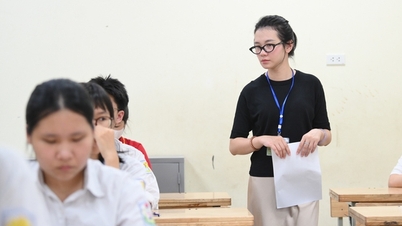



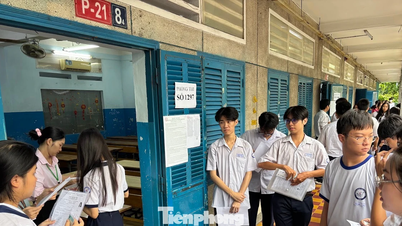



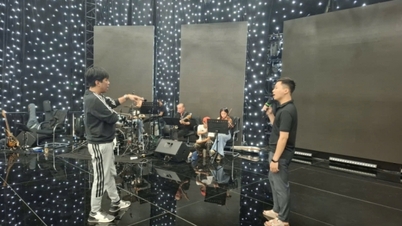
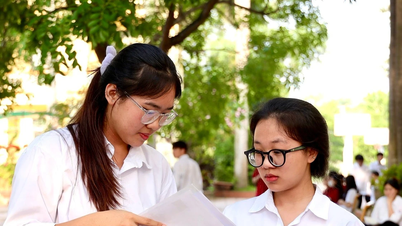
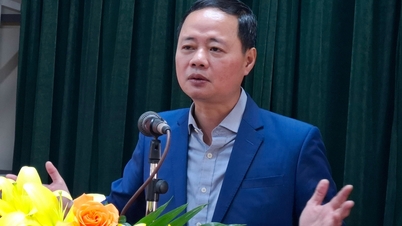



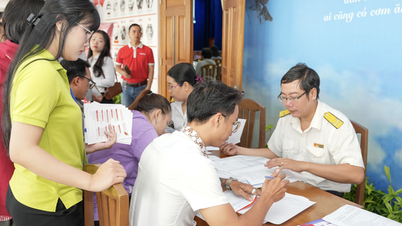
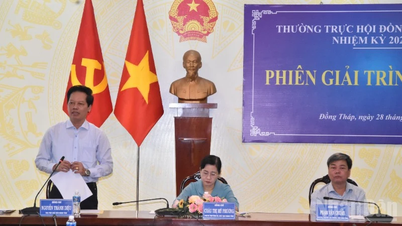

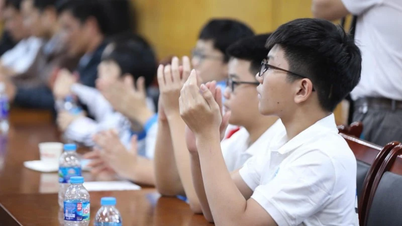









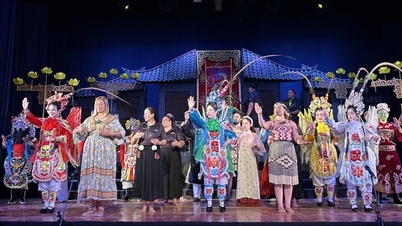























































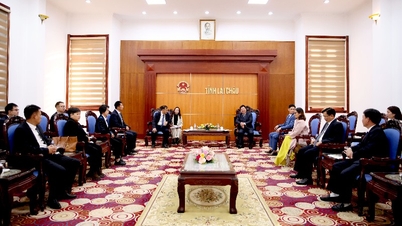

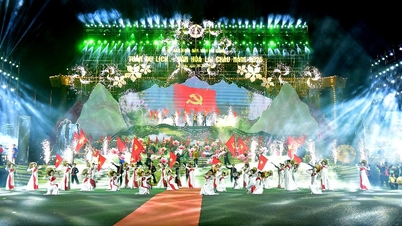















Comment (0)